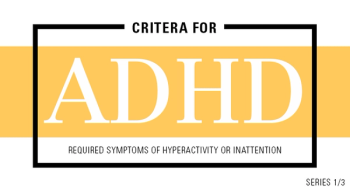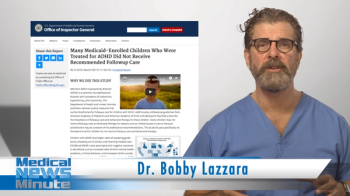
Attention-deficit/hyperactivity disorder (ADHD) is marked by age-inappropriate levels of inattention and activity. A report from Finland examines how relative immaturity in the first years of school could increase the risk of ADHD medication use.

Attention-deficit/hyperactivity disorder (ADHD) is marked by age-inappropriate levels of inattention and activity. A report from Finland examines how relative immaturity in the first years of school could increase the risk of ADHD medication use.

A good approach to knowing when a child needs referral for mental health evaluation, the Pediatric Symptom Checklist has evolved over the years to better screen children.

Endocrine-disrupting chemicals are nearly ubiquitous in day-to-day life. Could they be linked to attention-deficit/hyperactivity disorder-like (ADHD) behavior?

A recent study examined the impact of a nightly dose of pediatric prolonged-release melatonin on sleep disturbances in children with autism spectrum disorder.

Tics and attention-deficit/hyperactivity disorder can co-occur. A presentation at the 2020 Virtual Conference on Pediatric Health Care offers guidance.

A recent study investigates what is causing ASD to drop in wealthy, white California.

The US Food and Drug Administration (FDA) permitted marketing for the EndeavorRx, a game-based digital device meant to improve attention function in patients with attention-deficit/hyperactivity disorder (ADHD).

A new study adds to previous research on the impact of exposure in utero to antidepressants.

Despite clear guidelines opposing it, some children aged younger than 18 months get screen time with televisions, tablets, or cell phones. A new study indicates that these early exposures could increase the risk of autism spectrum disorder (ASD)-like symptoms later in life.

Doing a developmental screen is an important way to get children the help they need in a timely manner. A new study shows that utilizing standardized screening tools has increased, but there is still plenty of room for improvement.

Teenagers with attention-deficit/hyperactivity disorder (ADHD) or parent-reported “trouble staying focused” are poorer drivers and make more driving errors than their peers during the teenagers’ learning permit period according to recent survey data.

Attention-deficit/hyperactivity disorder (ADHD) and its comorbidities can pose significant challenges for children in your practice. It's imperative to know key symptoms as well as the criteria for the condition.

Let’s recap this year’s top devices for tech-savvy pediatricians. Are they on your wish list?

Motor skill delays are an early predictor of language delays later in childhood and into adulthood in individuals with autism spectrum disorder.

A new study reveals that mothers who are aged younger than 20 years when their first child is born were more likely to have a child with attention-deficit/hyperactivity disorder (ADHD), and researchers suggest maternal age and other genetic factors may be the cause.

The pediatric medical home is the perfect place for early diagnosis of children who may have autism spectrum disorder.

Children with ADHD often face other psychological or behavioral issues, and a new update to the clinical practice guidelines for the condition address how to manage them.

For years, researchers have raised concerns about acetaminophen use during pregnancy, now a new study that used cord blood to measure acetaminophen levels at birth links the commonly used medication to later ADHD and autism diagnoses.

Girls with ADHD are six times more likely to be teen moms, according a new report.

For Contemporary Pediatrics, Dr Bobby Lazzara discusses a study published by Department of Health and Human Services that examined whether children enrolled with Medicaid who had an ADHD diagnosis received the recommended followup care.

I have been asked by parents several time regarding the use of a cannabidiol (CBD) product to calm their aggressive autistic children when other medications have not been effective. It would be tempting to recommend CBD/THC products to help parents in this regard, but my concerns about safety as well as efficacy have dissuaded me from doing so.

'Building a medical home for children with autism' describes the importance of establishing a medical home in a pediatric office for children with a diagnosis of autistic spectrum disorder (ASD) and discusses five major management strategies for the successful management of children in the medical home.

For a child with a developmental disorder, the pathway from screening for autism spectrum disorder (ASD) to diagnosis of ASD to lifelong care takes place in the child’s medical home.

Elopement and wandering are serious problems for families of children with autism spectrum disorder (ASD). Here are practical ways primary care providers (PCPs) and families can work together to keep their children safe.

Maternal smoking has been linked to later development of attention-deficit/hyperactivity disorder (ADHD) in offspring in many studies, but a recent report shows that heavier smoking increases the risks even more.